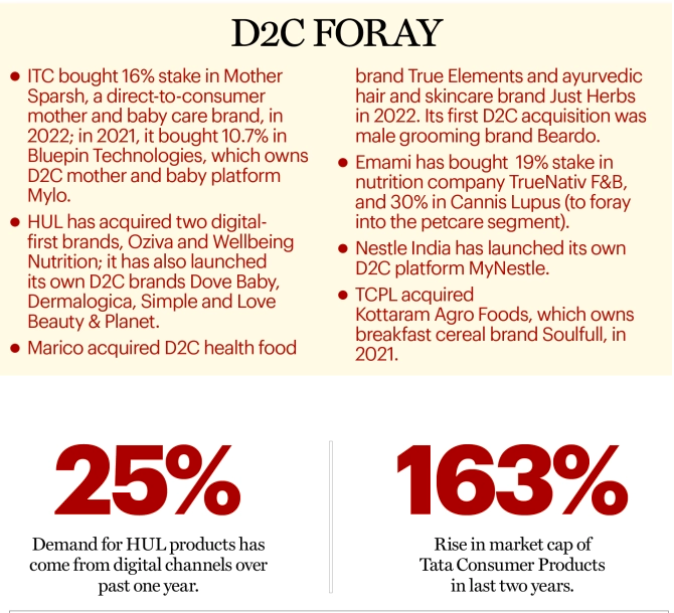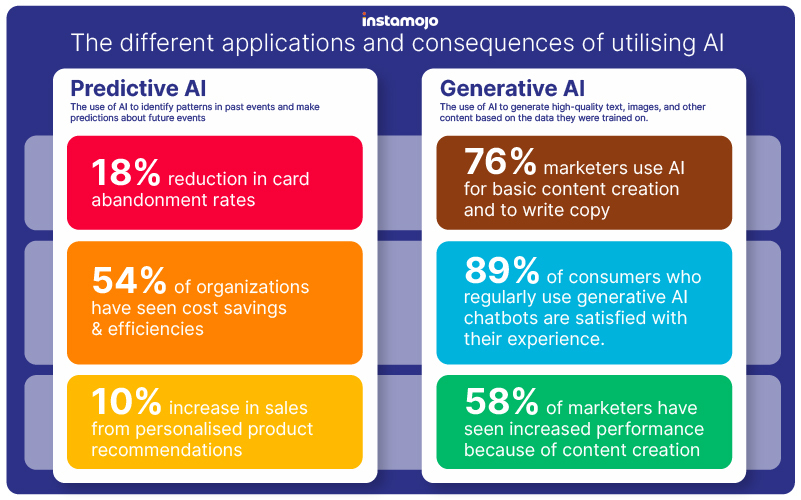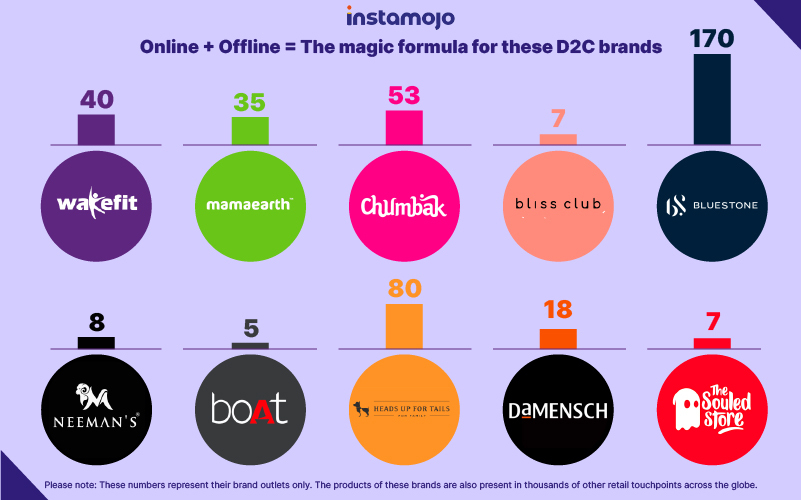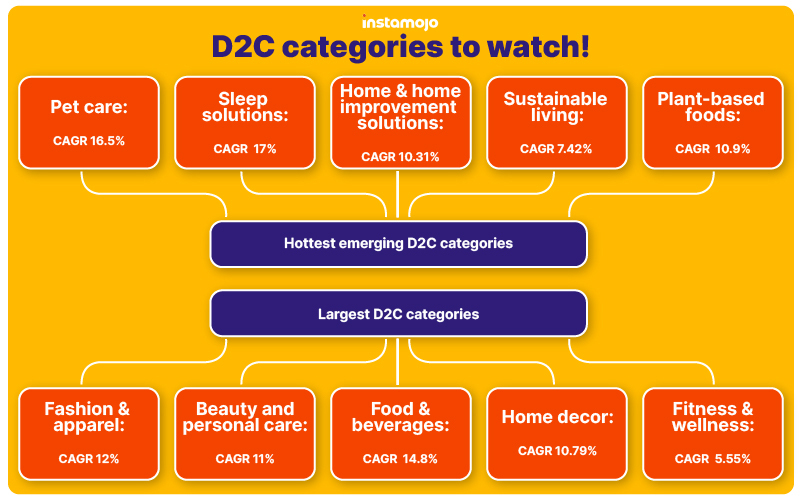The D2C eCommerce industry in India has seen a meteoric rise! Why D2C? It’s simple really. If the…
The D2C eCommerce industry in India has seen a meteoric rise! Why D2C? It’s simple really. If the 2000s were the era of foreign brands and the 2010s the era of marketplaces like Amazon – we are now in the era of D2C brands!
Brands now want more control over their business processes. They want to raise sales much faster. D2C brands that have their websites have a direct strategic insight into customer behaviour and practices!
With more control, comes more ease! Not to mention, with a business that is in your own hands, you are more likely to be innovative and creative.
Let’s dive deeper into the trends that will dominate the D2C eCommerce industry in 2024!
Thinking about starting your own eCommerce business? These 4 trends will tell you what will be the winning formula for D2C brands in 204.
Winds of change: Indian legacy brands are shifting to D2C
It’s not just us!! Legacy heritage brands in India are also launching their own Direct-to-Consumer (D2C) brands to undergo a crucial digital transformation. They have started recognizing the need to adapt to changing consumer preferences.
Customers want:
To build a community More accountability by brands Exemplary customer serviceFortune India has written a very interesting article on how FMCG giants have leveraged D2C platforms to come back stronger post-pandemic!
Here is a glimpse into the D2C brands and platforms launched by some of the biggest brands in the world!

Here’s a further breakdown of their D2C battle strategy. And of course, the profits and increase in revenue that it has brought:
 Source: Fortune India
Source: Fortune India
By establishing direct connections with consumers, these brands gain valuable insights, tailor offerings, and pivot swiftly in response to evolving trends.
Related read: Benefits of an eCommerce website: 10 reasons why every business needs one
What do these legacy brands gain by moving to their own D2C brands?
Market expansion beyond geographical constraints A data-driven approach enhances decision-making and allows for greater brand control Fosters agility and innovation, ensuring competitiveness in a dynamic digital landscape Serves as a strategic initiative for heritage brands to stay relevant and connect authentically with consumersRelated read: D2C eCommerce: Everything you need to know
Rise of AI in D2C eCommerce
Now that ChatGPT is all the rage. You will see how D2C brands are also reaping substantial benefits from the strategic integration of Generative AI for marketing and Predictive AI for understanding consumer behaviour.
Here’s a glimpse into why brands are sprinting after AI:

Generative AI plays a pivotal role in marketing by:
Enabling D2C brands to create compelling and personalised content at scale Utilizing vast datasets to generate creative and engaging marketing materials (from advertisements to social media content) It can cater to specific audience preferences and enhance brand resonanceGenerative AI can be used for:
Content creation Art and design creations Chatbots and virtual assistants Music Composition Code generation Video game character design Resume building CopywritingThe power of predictive AI
On the other hand, predictive AI is instrumental in decoding consumer behaviour by analyzing historical data and patterns.
This predictive capability allows D2C brands to:
Anticipate consumer needs Forecast trends Optimise inventory and pricing strategies Ensures a more responsive and customer-centric approachRelated read: Top AI tools for your eCommerce business (free + paid)
From digitally native to omnichannel: the new playbook
Indian D2C brands that initially established their presence through their own websites are venturing into physical stores for several strategic reasons.
While the digital realm offers extensive reach, physical stores provide:
A tangible touchpoint for customers fostering a more immersive brand experience and building trust Opening physical stores is a means to tap into a broader audience, particularly in regions where online presence may be lower or where customers prefer in-person shopping experiences Physical stores allow real-time interactions, enabling brands to gather immediate feedback and forge stronger customer connections.Here is an overview of some of India’s leading D2C brands and the presence of physical stores

Offline… but online remains king
Opening physical stores is a part of a successful omnichannel strategy for D2C brands. But, it can never replace your origins.
Maintaining a focus on your eCommerce website remains important for D2C brands as it is the foundation of your digital identity and global accessibility.
Here’s why an eCommerce website should serve as the central point of contact for your customers:
1. Global reach
Maintaining a strong focus on their eCommerce website ensures that D2C brands can reach a global audience and provide the convenience of online shopping.
2. Enhanced shopping experience
A well-optimised website allows customers to explore products, make purchases, and access brand information from anywhere, enhancing accessibility beyond the physical store locations.
Related read: How to optimise your online store homepage on Instamojo
3. Showrooming as a strategic advantage
What is showrooming? Brands can leverage their eCommerce website as a virtual showroom. Customers who visit physical stores to experience products can return to the website for detailed information, and reviews, and then potentially complete the purchase online.
A study by Salesforce showed how 60% of their survey respondents preferred showrooming before purchasing!
This synergistic approach capitalises on the strengths of both physical and online channels, offering customers flexibility in their shopping journey.
In our conversation with the CMO of Blissclub back in April for our #D2CTech conference, he broke down the fundamentals of omnichannel marketing. Watch it here:
4. 24/7 availability and seamless transactions
A dedicated eCommerce website ensures that the brand is available to customers 24/7.
This round-the-clock accessibility is particularly valuable for customers in different time zones or those with varied schedules, providing a seamless and convenient shopping experience.
5. Data-driven insights and personalization
The website serves as a hub for collecting valuable customer data and insights.
D2C brands can utilise analytics tools to understand customer behaviour, preferences, and buying patterns. This data-driven approach empowers brands to:
Personalise the online shopping experience Recommend relevant products Implement targeted marketing strategies Foster customer loyaltyRelated read: Data Analytics for Small Business: Our analytics dashboard
New-age D2C trendsetters

Categories like fashion, electronics and cosmetics are still at the heart of the Indian eCommerce industry. But there are new-age categories that are becoming quite the trendsetters!
From pampering pets to enhancing sleep quality, from elevating homes to embracing sustainability and plant-based living – these trends are weaving into the fabric of Indian consumer preferences.


